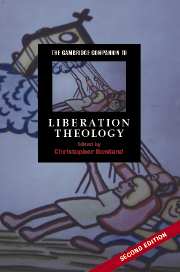Book contents
- Frontmatter
- Introduction: the theology of liberation
- Part I Contemporary Liberation Theology
- Part II Aspects of Liberation Theology
- 7 The origins and character of the base ecclesial community: a Brazilian perspective
- 8 The Bible and the poor: a new way of doing theology
- 9 Liberation and reconstruction: the unfinished agenda
- Part III Analysis and Criticism
- Epilogue: the future of liberation theology
- Select bibliography
- Index
- Series list
9 - Liberationand reconstruction: the unfinished agenda
from Part II - Aspects of Liberation Theology
Published online by Cambridge University Press: 28 January 2008
- Frontmatter
- Introduction: the theology of liberation
- Part I Contemporary Liberation Theology
- Part II Aspects of Liberation Theology
- 7 The origins and character of the base ecclesial community: a Brazilian perspective
- 8 The Bible and the poor: a new way of doing theology
- 9 Liberation and reconstruction: the unfinished agenda
- Part III Analysis and Criticism
- Epilogue: the future of liberation theology
- Select bibliography
- Index
- Series list
Summary
Liberation theology - an umbrella term embracing a number of particularmovements, including African, black, feminist, and womanist theologies - isself-consciously contextual. While having certain characteristics in common,specific liberation theologies need to be understood in terms of their particularcontexts. In this chapter attention is first given to the broad and inclusivetenets of Latin American liberation theology. The second part explores some of thechallenges facing liberation theologians in the wider context defined by thepost-cold war period; in particular, the situation of the poor in the changingcontexts of debate. Specific attention is given to the changing South Africancontext within which the present writer is located.
There is, of course, no one prevailing context in any particularLatin American country or in South Africa. Divisions of class, race, gender andchoice continue to ferment the liberation theology debate, and each of these is,in turn, profoundly affected by the changes that have taken place in differentregional contexts since the 1960s. The Medellín and Puebla conferences of1968 and 1979 gave formative expression to Latin American liberation theology,which formed part of the revolutionary milieu that swept South and Central Americaduring this time. In Europe 1968 was the year of the Prague Spring. In NorthAmerica the 1960s were the time of the Black Power movement. In South Africa,Black theology and liberation theology were born in the late 1960s, reaching theirhighwater mark with the publication of the Kairos Document in1985, while Black theology regained a sense of prominence in the debate at more orless the same time. The divide between the forces of resistance and liberation,throughout this period, was crisp, clear and relatively uncomplicated.
- Type
- Chapter
- Information
- The Cambridge Companion to Liberation Theology , pp. 183 - 206Publisher: Cambridge University PressPrint publication year: 2007
- 4
- Cited by

